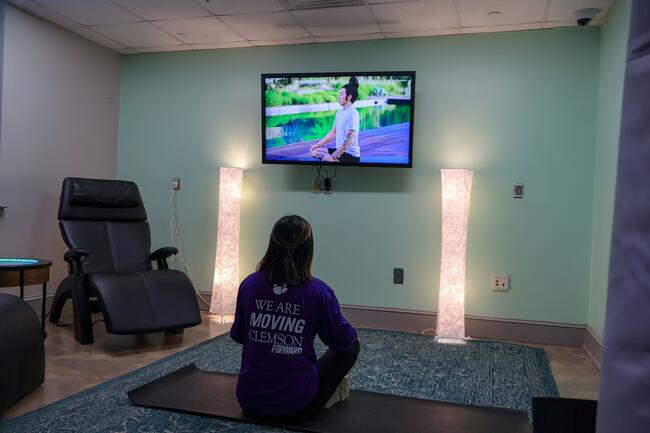You have /5 articles left.
Sign up for a free account or log in.

Clemson University created a new space, the Wellness Zone, which allows students to engage in holistic virtual fitness activities such as yoga.
Clemson University
Personal well-being—particularly related to mental health—is one of the greatest threats to persistence among college students.
Forty percent of students say mental health has “a great deal” of impact on their ability to focus, learn and perform academically, according to a May 2024 Student Voice survey by Inside Higher Ed and Generation Lab. Additionally, 19 percent of respondents believe their physical health impacts their academic success a great deal.
Colleges and universities are responding to this growing need for support; a 2024 Inside Higher Ed survey of college presidents found that 70 percent of respondents had invested in wellness facilities or services to promote overall well-being among students in the past year.
But students aren’t entirely satisfied with the offerings on their campuses; only 46 percent of Student Voice respondents rated the quality of campus health and wellness services as good or excellent.
Inside Higher Ed compiled five examples of new support resources universities are offering to improve student well-being and, in turn, their retention and graduation. Many focus on students’ self-regulation through meditation and reflection, tools that can help them manage physical and socio-emotional health.
- University of Texas, Dallas: Brain Recharge Station
In a small room located in the Eugene McDermott Library and Center for Brain Health, students are encouraged to take “brain breaks,” or short, intentional pauses to prime themselves for more focused, deeper thinking.
The room can only be used by one person at a time, and visitors are encouraged to turn off devices and set aside reading materials during this break.
- San Diego State University, Imperial Valley: Student Wellness and Success Center
The SDSU, Imperial Valley, administration cut the ribbon on a new wellness and success center in March, creating dedicated space for counseling and health services—as well as career, veterans’, student success and retention services. The goal is to offer holistic support in a one-stop shop. Imperial Valley is a commuter campus, with student housing under construction, making these resources particularly helpful for those living and studying in the area.
Counseling center services include crisis intervention, assessment and short-term therapy. The health center provides low- or no-cost medical services including preventive care, immunizations and psychiatric treatments.
- Clemson University: Wellness Zone
Clemson’s Fike Recreation Center is home to the Wellness Zone, a private room that an individual or group of students can reserve to engage in various activities. Created as a virtual fitness space, the room includes a touch-screen TV and zero-gravity chairs. Students can participate in self-paced yoga, stretching, mindfulness, breath work and meditation, as well as traditional exercises guided by an instructor on the TV.
- Indiana University, Bloomington: Wellness House
IU repurposed an old sorority house on campus to centralize mental and physical health service offices, combining Student Wellness, Substance Use Intervention Services and the Collegiate Recovery Community offices under one roof.
In addition to staff offices, the new Wellness House also features reservable spaces for campus groups and four rooms where students can relax and meditate. Each room has a different theme and features; for example, the Fireplace Room is focused on studying and unwinding, whereas the Quiet Room has flexible seating such as beanbags and pillows for greater relaxation.
The goal is to provide an entry point for students who may be overwhelmed, potentially connecting them with relevant offices located in the Wellness House while they engage in other activities.
- Yale University: The Good Life Center
In 2021, Yale opened the doors to its Good Life Center, a space for unwinding and destressing; this year the university doubled the size of the space to accommodate more students.
The expansion includes five more themed rooms: the tree house, music room, game room, sensory room and balance room. Each offers wellness activities and features related to its theme, such as musical instruments, mini basketball hoops and sound-absorbing chairs.
The sensory room was designed in collaboration with Student Accessibility Services to provide specialized furniture and resources for students of all needs and abilities.
Do you have a wellness intervention that might help others promote student success? Tell us about it.




